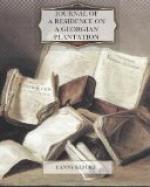I am rather surprised at the outbreak of violent disgust which Mr. —— indulges in on the subject of amalgamation; as that formed no part of our discussion, and seems to me a curious subject for abstract argument. I should think the intermarrying between blacks and whites a matter to be as little insisted upon if repugnant, as prevented if agreeable to the majority of the two races. At the same time, I cannot help being astonished at the furious and ungoverned execration which all reference to the possibility of a fusion of the races draws down upon those who suggest it; because nobody pretends to deny that, throughout the South, a large proportion of the population is the offspring of white men and coloured women. In New Orleans, a class of unhappy females exists whose mingled blood does not prevent their being remarkable for their beauty, and with whom no man, no gentleman, in that city shrinks from associating; and while the slaveowners of the Southern States insist vehemently upon the mental and physical inferiority of the blacks, they are benevolently doing their best, in one way at least, to raise and improve the degraded race, and the bastard population which forms so ominous an element in the social safety of their cities certainly exhibit in their forms and features the benefit they derive from their white progenitors. It is hard to conceive that some mental improvement does not accompany this physical change. Already the finer forms of the European races are cast in these




